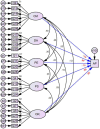Reducing the influence of perfectionism and statistics anxiety on college student performance in statistics courses
- PMID: 36312114
- PMCID: PMC9597487
- DOI: 10.3389/fpsyg.2022.1011278
Reducing the influence of perfectionism and statistics anxiety on college student performance in statistics courses
Abstract
The influence of perfectionism and statistics anxiety on academic performance (AP) in statistics courses was investigated using a multidimensional perfectionism scale and a statistics anxiety rating scale. For perfectionism, the factor of personal standards (PS) had a significant direct positive effect on AP, while the factor of parental expectations (PE) was significantly negatively correlated with AP. Other factors (concern over mistakes, organization, and doubts about actions) did not significantly influence AP. For statistics anxiety, the two factors (test and class anxiety and computation self-concept) significantly impaired AP. These results indicated a need for innovation in classroom instruction and the reform of statistics course content and presentation to reduce statistics anxiety and improve PS. There is also a need to ensure that students better internalize PE and to revise instructional design techniques to enhance students' independent learning ability.
Keywords: academic performance; multidimensional perfectionism scale; personal standards; statistics anxiety; teaching innovation.
Copyright © 2022 Wu, Chen, Li and Zhou.
Conflict of interest statement
The authors declare that the research was conducted in the absence of any commercial or financial relationships that could be construed as a potential conflict of interest.
Figures




Similar articles
-
[Failure effects and gender differences in perfectionism].Encephale. 2003 Mar-Apr;29(2):125-35. Encephale. 2003. PMID: 14567164 French.
-
How Are Different Perfectionism Traits Related to Mental Health in Students?Behav Sci (Basel). 2024 Feb 27;14(3):187. doi: 10.3390/bs14030187. Behav Sci (Basel). 2024. PMID: 38540490 Free PMC article.
-
Predicting adolescent perfectionism: The role of socio-demographic traits, personal relationships, and media.World J Clin Cases. 2022 Jan 7;10(1):189-204. doi: 10.12998/wjcc.v10.i1.189. World J Clin Cases. 2022. PMID: 35071518 Free PMC article.
-
Does perfectionism or pursuit of excellence contribute to successful learning? A meta-analytic review.Psychol Assess. 2020 Oct;32(10):972-983. doi: 10.1037/pas0000942. Epub 2020 Jul 27. Psychol Assess. 2020. PMID: 32718164
-
Motivating Students in the 21st Century.Radiol Technol. 2016 Jul;87(6):609-16. Radiol Technol. 2016. PMID: 27390228 Review.
Cited by
-
Model-based estimation of the leaf area of ozone-indicator tobacco (Nicotiana tabacum L.) plants under ambient ozone conditions.MethodsX. 2023 May 10;10:102214. doi: 10.1016/j.mex.2023.102214. eCollection 2023. MethodsX. 2023. PMID: 37205180 Free PMC article.
References
-
- Arpaci I., Baloğlu M. (2016). The impact of cultural collectivism on knowledge sharing among information technology majoring undergraduates. Comput. Hum. Behav. 56 65–71. 10.1016/j.chb.2015.11.031 - DOI
-
- Bieling P. J., Israeli A., Smith J., Antony M. M. (2003). Making the grade: The behavioural consequences of perfectionism in the classroom. Pers. Individ. Differ. 35 163–178. 10.1016/S0191-8869(02)00173-3 - DOI
-
- Bordley R. F., Robert F. (2001). Teaching decision theory in applied statistics courses. J. Stat. Educ. 9. 10.1080/10691898.2001.11910654 - DOI
-
- Brown E. J., Heimburg R. G., Frost R. O., Makris G. S., Juster H. R., Leung A. W. (1999). Relationship of perfectionism to affect, expectations, attributions and performance in the classroom. J. Clin. Psychol. 18 98–120. 10.1521/jscp.1999.18.1.98 - DOI
LinkOut - more resources
Full Text Sources

